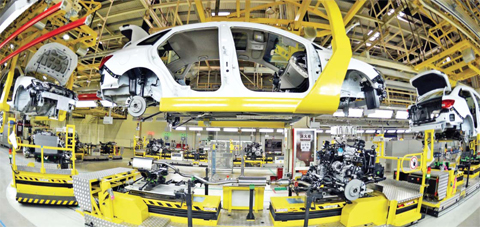BARCELONA: Spain’s second city Barcelona and much of the surrounding region of Catalonia entered a drought emergency Thursday, clearing the way for tighter water restrictions after three years without significant rainfall. Catalonia’s regional government chief Pere Aragones declared fresh restrictions after water levels at reservoirs in the Mediterranean region fell below 16 percent of full capacity.
That is the benchmark set by the authorities for applying a new round of water-saving measures that will affect some six million people. “Catalonia is suffering the worst drought in the last century,” Aragones told journalists. “We have never faced such a long and intense drought since rainfall records began.”
Rainwater levels in some reservoirs in Catalonia are so low that old bridges and a church bell tower have resurfaced. The emergency measures are designed to lower the daily amount of water that households and local councils are allowed to use: from 210 to 200 liters (55 to 52 gallons) per person.
If the drought worsens, the limit could be lowered to 180 liters, then 160 liters. The water-use restrictions will apply to the regional capital Barcelona and 201 surrounding local councils from Friday, affecting some six million people.
Measures include a ban on fresh-water in swimming pools, with some exceptions for recognized use in sports. Cars can now only be washed with recycled water, and public gardens irrigated with groundwater. Tighter restrictions, such as closing showers in gyms and totally banning watering in public parks, could be introduced if the drought persists.
‘Catastrophic’
Farms and industries will also face greater cuts. Emergency measures aim to cut the amount of water used to irrigate crops by 80 percent, doubling the 40-percent reduction introduced last November. Industries must cut water use by 25 percent, whereas previously it was 15 percent. “We will overcome the drought through cooperation, shared effort, planning and well-directed investments,” said Aragones.
Rainfall has been lower than the average in Catalonia for the past three years. The drought has lasted more than twice as long as the previous dry spell of 2008, the regional government says. “If it goes on for another year, the situation will be catastrophic,” head of the civil and environmental engineering department at Catalonia’s Polytechnic University, Xavier Sanchez Vila, told AFP.
As well as Catalonia, in northeast Spain, the southern region of Andalusia is also struggling with severe drought. The regional authorities there have warned that water use restrictions will be needed in Seville and Malaga this summer if rain does not return.
Water supplies by boat
Andalusia and Catalonia are Spain’s two most populous regions. Both are preparing to import fresh water by boat if needed, an expensive option that officials admit would not make up for the lack of rain. “We need 30 days of rain,” the head of the Andalusia regional government, Juan Manuel Moreno, said recently. “But real rain, not just drizzle — at least 30 straight days of it.” Several heatwaves recorded in Spain and wider Europe last summer aggravated the shortage because more water evaporated from reservoirs, and consumers used more to keep cool. Unseasonably warm weather has continued into 2024.
Temperatures rose to nearly 30 degrees Celsius (86 Fahrenheit) in some regions in January — something usually seen in June. Experts say climate change driven by human activity is boosting the intensity and frequency of extreme weather events, such as heatwaves, droughts and wildfires.
Catalonia has built desalination plants and adopted other measures, but some campaigners say it is crucial to improve the use of both wastewater and groundwater resources. “The drought is not just due to a lack of rain, it is the result of bad management,” Greenpeace said in a statement. — AFP










